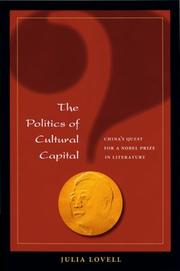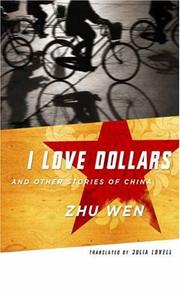| Listing 1 - 10 of 20 | << page >> |
Sort by
|
Book
ISBN: 9781847922496 9781847922502 Year: 2019 Publisher: London : The Bodley Head,
Abstract | Keywords | Export | Availability | Bookmark
 Loading...
Loading...Choose an application
- Reference Manager
- EndNote
- RefWorks (Direct export to RefWorks)
For decades, the West has dismissed Maoism as an outdated historical and political phenomenon. Since the 1980s, China seems to have abandoned the utopian turmoil of Mao's revolution in favour of authoritarian capitalism. But Mao and his ideas remain central to the People's Republic and the legitimacy of its Communist government. With disagreements and conflicts between China and the West on the rise, the need to understand the political legacy of Mao is urgent and growing.0The power and appeal of Maoism have extended far beyond China. Maoism was a crucial motor of the Cold War: it shaped the course of the Vietnam War (and the international youth rebellions that conflict triggered) and brought to power the murderous Khmer Rouge in Cambodia; it aided, and sometimes handed victory to, anti-colonial resistance movements in Africa; it inspired terrorism in Germany and Italy, and wars and insurgencies in Peru, India and Nepal, some of which are still with us today - more than forty years after the death of Mao.0In this new history, Julia Lovell re-evaluates Maoism as both a Chinese and an international force, linking its evolution in China with its global legacy. It is a story that takes us from the tea plantations of north India to the sierras of the Andes, from Paris's fifth arrondissement to the fields of Tanzania, from the rice paddies of Cambodia to the terraces of Brixton.0Starting with the birth of Mao's revolution in northwest China in the 1930s and concluding with its violent afterlives in South Asia and resurgence in the People's Republic today, this is a landmark history of global Maoism.
Communism --- Communisme --- Mao, Zedong, --- Mao, Ze dong --- Naxalite movement --- Globalization --- S06/0405 --- S06/0432 --- Global cities --- Globalisation --- Internationalization --- International relations --- Anti-globalization movement --- History --- China: Politics and government--CCP, history and ideology: general --- China: Politics and government--About works and thought of Mao Zedong; Mao Cult --- Mao, Zedong --- Mao Tse-Toung --- Mao Tsetoeng --- Mao Tsetoung --- Mao Tsetung --- Mao, Tse-Toung --- Mao, Tsé toung --- Mao, Tse-Tung --- Mau Tse-Toeng --- 毛泽东 --- 毛澤東 --- China --- Politics and government
Book
ISBN: 1843542153 9781843542155 Year: 2007 Publisher: London : Atlantic Books,
Abstract | Keywords | Export | Availability | Bookmark
 Loading...
Loading...Choose an application
- Reference Manager
- EndNote
- RefWorks (Direct export to RefWorks)
In this landmark and controversial debut book, Julia Lovell tackes the history of China - and its relationship with the wider world - through the dramatic story of its most famous landmark.
China --- China. --- Chine --- Grande Muraille (Chine) --- Great Wall of China (China) --- History. --- Histoire.
Book
ISBN: 9780525565901 9780525656050 Year: 2020 Publisher: New York, N.Y. Vintage Books, a division of Penguin Random House LLC
Abstract | Keywords | Export | Availability | Bookmark
 Loading...
Loading...Choose an application
- Reference Manager
- EndNote
- RefWorks (Direct export to RefWorks)
Political philosophy. Social philosophy --- Political systems --- Mao Zedong

ISBN: 082482962X 0824830180 9780824829629 9780824830182 0824864956 Year: 2006 Publisher: Honolulu University of Hawaii press
Abstract | Keywords | Export | Availability | Bookmark
 Loading...
Loading...Choose an application
- Reference Manager
- EndNote
- RefWorks (Direct export to RefWorks)
Chinese literature --- Intellectuals --- Nobel Prizes --- Social aspects
Book
ISBN: 9780330457484 Year: 2012 Publisher: London Picador
Abstract | Keywords | Export | Availability | Bookmark
 Loading...
Loading...Choose an application
- Reference Manager
- EndNote
- RefWorks (Direct export to RefWorks)
Book
ISBN: 9780824864958 Year: 2006 Publisher: Honolulu
Abstract | Keywords | Export | Availability | Bookmark
 Loading...
Loading...Choose an application
- Reference Manager
- EndNote
- RefWorks (Direct export to RefWorks)

ISBN: 9780824864958 9780824829629 Year: 2006 Publisher: Honolulu, Hawaii University of Hawaii Press
Abstract | Keywords | Export | Availability | Bookmark
 Loading...
Loading...Choose an application
- Reference Manager
- EndNote
- RefWorks (Direct export to RefWorks)

ISBN: 0231136943 9780231136945 9786613008695 1283008696 0231510225 9780231510226 9781283008693 6613008699 Year: 2007 Publisher: New York, NY
Abstract | Keywords | Export | Availability | Bookmark
 Loading...
Loading...Choose an application
- Reference Manager
- EndNote
- RefWorks (Direct export to RefWorks)
In five richly imaginative novellas and a short story, Zhu Wen depicts the violence, chaos, and dark comedy of China in the post-Mao era. A frank reflection of the seamier side of his nation's increasingly capitalist society, Zhu Wen's fiction offers an audaciously plainspoken account of the often hedonistic individualism that is feverishly taking root. Set against the mundane landscapes of contemporary China-a worn Yangtze River vessel, cheap diners, a failing factory, a for-profit hospital operating by dated socialist norms-Zhu Wen's stories zoom in on the often tragicomic minutiae of everyday life in this fast-changing country. With subjects ranging from provincial mafiosi to nightmarish families and oppressed factory workers, his claustrophobic narratives depict a spiritually bankrupt society, periodically rocked by spasms of uncontrolled violence. For example, I Love Dollars, a story about casual sex in a provincial city whose caustic portrayal of numb disillusionment and cynicism, caused an immediate sensation in the Chinese literary establishment when it was first published. The novella's loose, colloquial voice and sharp focus on the indignity and iniquity of a society trapped between communism and capitalism showcase Zhu Wen's exceptional ability to make literary sense of the bizarre, ideologically confused amalgam that is contemporary China. Julia Lovell's fluent translation deftly reproduces Zhu Wen's wry sense of humor and powerful command of detail and atmosphere. The first book-length publication of Zhu Wen's fiction in English, I Love Dollars and Other Stories of China offers readers access to a trailblazing author and marks a major contribution to Chinese literature in English.
Book
ISBN: 0231535074 9780231535076 9780231160902 0231160909 Year: 2013 Publisher: New York, NY
Abstract | Keywords | Export | Availability | Bookmark
 Loading...
Loading...Choose an application
- Reference Manager
- EndNote
- RefWorks (Direct export to RefWorks)
The Matchmaker, the Apprentice, and the Football Fan moves between anarchic campuses, maddening communist factories, and the victims of China's economic miracle to showcase the absurdity, injustice, and socialist Gothic of everyday Chinese life. In "The Football Fan," readers fall in with an intriguingly unreliable narrator who may or may not have killed his elderly neighbor for a few hundred yuan. The bemused antihero of "Reeducation" is appalled to discover that, ten years after graduating during the pro-democracy protests of 1989, his alma mater has summoned him back for a punitive bout of political reeducation with a troublesome ex-girlfriend. "Da Ma's Way of Talking" is a fast, funny recollection of China's picaresque late 1980s, told through the life and times of one of our student narrator's more controversial classmates; while "The Apprentice" plunges us into the comic vexations of life in a more-or-less planned economy, as an enthusiastic young graduate is over-exercised by his table-tennis-fanatic bosses, deprived of sleep by gambling-addicted colleagues, and stuffed with hard-boiled eggs by an overzealous landlady. Full of acute observations, political bite, and piercing insight into friendships and romance, these stories further establish Zhu Wen as a fearless commentator on human nature and contemporary China.
Book
ISBN: 9780141033976 Year: 2008 Publisher: London : Penguin books,
Abstract | Keywords | Export | Availability | Bookmark
 Loading...
Loading...Choose an application
- Reference Manager
- EndNote
- RefWorks (Direct export to RefWorks)
| Listing 1 - 10 of 20 | << page >> |
Sort by
|

 Search
Search Feedback
Feedback About UniCat
About UniCat  Help
Help News
News